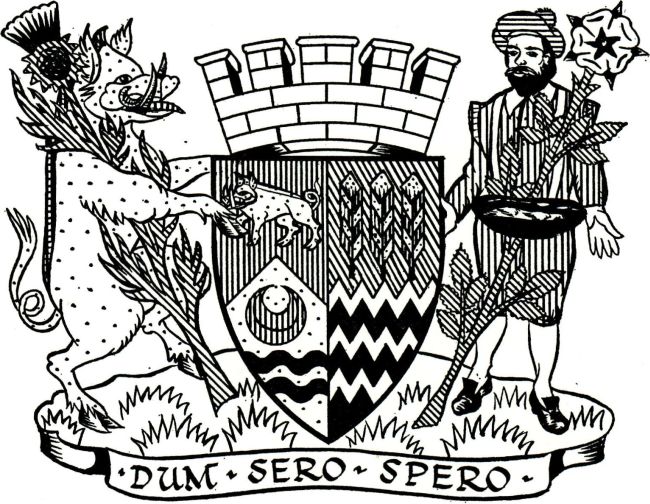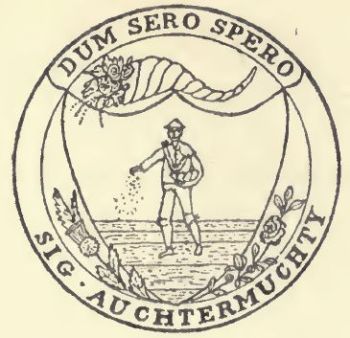Auchtermuchty
| Heraldry of the World |
| British heraldry portal Civic heraldry of the United Kingdom |
|
AUCHTERMUCHTY
Incorporated into : 1975 North East Fife District Council (1996 Fife Area Council)
Official blazon
Per pale: dexter, per chevron Gules and Or, a boar passant Or in chief and in base a crescent of the First accompanied by two barrulets wavy Sable; sinister, per fess indented Vert and harry of six indented Argent and Sable, three barley heads paleways Or and Gules in chief.
Below the Shield, which is ensigned of a coronet proper to a Royal Burgh, upon a Compartment with this Motto "Dum Sero Spero" are set for Supporters dexter, a boar Or, langued and bristled Gules, and armed and hooved Proper; sinister, a countryman attired in doublet and breeches Gules, stockings Argent and shoes Sable, upon his head a blue bonnet, and with his left hand sowing from a seed-basket, both supporters sustaining over their exterior shoulders respectively a thistle and a rose stem, leaved Vert and flowered Proper.
Origin/meaning
The arms were granted on July 25, 1966.
Auchtermuchty was made a Royal Burgh by King James V in 1517
The arms show on the dexter side a boar above a chevron to recall that Auchtermuchty means "upland of the boars"; the boar is a royal boar, as indicated by the gold and red colours, from Falkland Forest, of which the site of the town once formed part; below, there is a red Seton crescent in reference to George Seytoun, a near kinsman of George, 5th Lord Seton, the faithful adherent of Mary, Queen of Scots; in 1542 he obtained part of the south quarter of Auchtermuchty.
The black wavy lines allude to the swampy ground of the district and to Myres Castle near the town.
The sinister side shows the barley grown in the fertile fields of Auchtermuchty and used for whisky distilling, and, in the lower part, the ground where the sower (the sinister supporter) casts his seed.
The supporters are a Royal boar from Falkland Forest and a countryman sowing seed; the latter comes from the Burgh seal which showed a sower at his work in a field.
The thistle and the rose also come from the seal and respectively recall the Charter of King James V in 1517 and the confirmation by King Charles I in 1631 of a Charter granted by King James VI in 1591.
The Latin motto "While I sow, I hope" was on the Burgh seal.
| Seal of the burgh as used in the 1890s |
Contact and Support
Partners:
Your logo here ?
Contact us
© since 1995, Heraldry of the World, Ralf Hartemink 
Index of the site
Literature : Porteous, 1906; Urquhart, 1974













